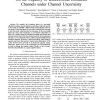Free Online Productivity Tools
i2Speak
i2Symbol
i2OCR
iTex2Img
iWeb2Print
iWeb2Shot
i2Type
iPdf2Split
iPdf2Merge
i2Bopomofo
i2Arabic
i2Style
i2Image
i2PDF
iLatex2Rtf
Sci2ools
136
click to vote
ICC
2009
IEEE
2009
IEEE
On the Capacity of Bidirectional Broadcast Channels under Channel Uncertainty
We consider the broadcast phase of a spectrally efficient two-phase decode-and-forward protocol which is used by a relay node to establish a bidirectional communication between two nodes. In the first phase the two nodes transmit their message to the relay node which decodes the messages. In the succeeding phase the relay node broadcasts a re-encoded composition of them. We consider imperfect channel knowledge and assume that all nodes merely know that the channel used for the transmission belongs to a set of channels. This is called compound bidirectional broadcast channel. We derive a universal strategy which achieves capacity and show that perfect channel state information (CSI) at the receivers does not lead to an increased capacity region. Otherwise, perfect CSI at the transmitter can advantageously be used to enlarge the capacity region. Finally, we give a gametheoretic interpretation as a game against nature.
Related Content
| Added | 18 Feb 2011 |
| Updated | 18 Feb 2011 |
| Type | Journal |
| Year | 2009 |
| Where | ICC |
| Authors | Rafael F. Wyrembelski, Igor Bjelakovic, Tobias J. Oechtering, Holger Boche |
Comments (0)

